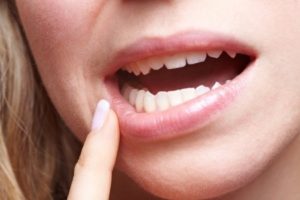
Receding gums is a common dental problem, especially in patients over the age of 40. Receding gums is a slow process in which the gum tissue moves away from teeth. More of the tooth is exposed. It usually goes unnoticed because it occurs so gradually. The first sign may be tooth sensitivity, or you may realize that your tooth looks longer than normal.
Pockets develop near the gum line between the teeth and gums. Bacteria begin to build up in these pockets, and left untreated, can damage the bone and the supportive tissue that hold the teeth in place. This can lead to tooth loss.
What Causes Receding Gums?
There are several factors that cause the gums to recede. Some factors are our own fault, such as body piercings of the lip or tongue. Other causes are beyond our control, such as genetics.
Gums recede when the gums are infected and the tissue and bone are weakened. The most common cause of receding gums is gum disease.
Other causes include brushing teeth aggressively, hormone changes, tobacco usage, grinding teeth and a misaligned bite.
What Are the Symptoms of Receding Gums?
The first symptom of receding gums is generally tooth sensitivity. This is due to the fact that the receding gum is exposing a portion of the root. Sometimes a notch can be noticed near the gum line.
Can I Really Reverse Receding Gums?
Yes, surgical procedures are available to reverse recession. This procedure can include grafting gum tissue or bone in the affected areas. There are also changes you can make at home to keep the problem from reoccurring:
- If tobacco products are causing gums to recede, stop using tobacco and find a healthy substitute.
- A healthy diet is important to healthy gums. Use a good daily vitamin supplement and make certain you are obtaining the daily minerals required.
- Brush after each meal, but don’t attack your teeth and gums.
- Use a soft toothbrush. Your dentist will recommend a toothbrush that is not too large for your mouth, as well as a brush with soft bristles. A brush with medium or hard bristles will only cause further trauma to the gums which can lead to further recession.
- Floss regularly.
- See your dentist for regular visits. Cleanings are very important for removing the plaque that can cause gingivitis.
Gum recession is not something you should ignore. If you think your gums are receding, make an appointment with your dentist. There are treatments that can repair the gums and prevent further damage.
The Difference Between Treatment and Care
At Osborne Family Dental, we believe in caring treatment. Routine dental check-ups and cleanings are essential for healthy teeth and gums. Routine x-rays are necessary to reveal potential cavities, infections, and unhealthy teeth. We believe in proactive treatment given with great care.
Contact us today to schedule a convenient appointment to check your receding gums.






 You should speak with Dr. Osborne as soon as possible if you experience any of the symptoms related to stopping breathing, specifically episodes of “gasping for breath” while sleeping or awakening from sleep feeling out of breath. In addition, if your snoring is loud enough to wake someone or is loudest after periods of what appear to be episodes of not breathing, you should schedule an appointment immediately. In addition, if your inability to concentrate or short attention span affects your ability to work effectively or safely, or any of the symptoms from this list last more than a couple days, consult with Dr. Osborne and what steps to take next.
You should speak with Dr. Osborne as soon as possible if you experience any of the symptoms related to stopping breathing, specifically episodes of “gasping for breath” while sleeping or awakening from sleep feeling out of breath. In addition, if your snoring is loud enough to wake someone or is loudest after periods of what appear to be episodes of not breathing, you should schedule an appointment immediately. In addition, if your inability to concentrate or short attention span affects your ability to work effectively or safely, or any of the symptoms from this list last more than a couple days, consult with Dr. Osborne and what steps to take next. At your most recent dental appointment, your dentist may have fit you with a mouth guard, occlusal guard (often called a night guard), or other oral appliance. While it may take some getting used to, with regular use and proper care, your guard will protect your teeth for years to come. Follow these simple steps to care for your guard.
At your most recent dental appointment, your dentist may have fit you with a mouth guard, occlusal guard (often called a night guard), or other oral appliance. While it may take some getting used to, with regular use and proper care, your guard will protect your teeth for years to come. Follow these simple steps to care for your guard.